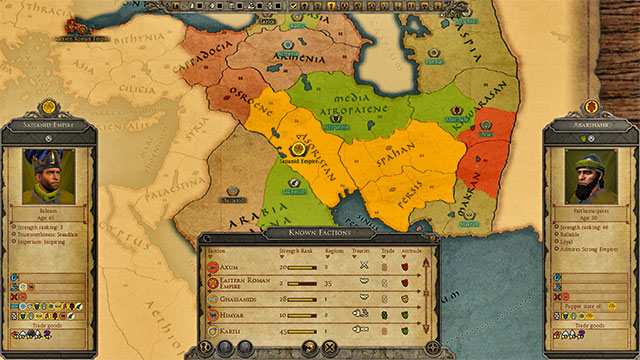Diplomacy | Court and state authority

Just as in other installments of the series, in Attila diplomacy is more like an addition that important element of the game. Diplomatic options offered by game are very limited and focus on two things - resources for waging war, like money from trade or allies, and war itself. And that is how you should treat it - as a set of additional ways for preparing yourself to war.
Diplomatic relations start automatically between two countries that can see each other. Another country must be your neighbor, you must see it through an allied country, get to it with your military or in any other way discover its existence. Because of that, a horde that through whole game remains in the western part of Western Roman Empire can have diplomatic relations with Byzantine Empire, although both countries lies on different parts of the continent.
Relations
Though defined with digits, they have three states - good, shown with green icon, neutral, marked with yellow icon and bad, with red icon. Relations can change, become better or worse, but they can't get beyond those three categories. It is a clear information about your diplomatic possibilities. If relations between you and another country are green, then you will be able to negotiate most treaties. If they are yellow, your possibilities are limited. When they drop to red, probably the only thing that you will be able to negotiate with your enemy, is war.
Many factors have impact on relations. Much of them you won't be able to eliminate, like wrong culture or to high empire level. Other, like hostile religion, are possible, but hard to change. Because of that, the more further in the game, the harder it is to make an enemy country your ally. Too many different, gathered through whole game factors will make it harder for you.
In order to improve relations between countries, you should start with money and trading. Money are spent on gifts, and for trading you will need land or sea road and a signed treat. Money allow for quick, and trade for regular improve of relations. Next are diplomatic marriages, military treaties, and at the very end - military alliance. Proposition of becoming a puppet or tributary state (depends on faction) is usually considered as negative by most countries. You must be a trusted ally and trading partner for many years for such proposition to be accepted.
Character of leader
Under the image of country leader you will see a list of traits of that leader. Thanks to them you will know if you can allow yourself to break a treat with him, is he easy to forgive betrayal and if he is in some way prejudiced towards you because of your culture. Those characteristics might be important, but it depends on situation. For example, you shouldn't abandon an ally that can't forgive, as you will make yourself an enemy for the rest of the game. But you shouldn't make an alliance with him as well, as it might get you under a wall - you either fight at his side or break relations with him for long time. Situation when a nation is powerful and it is wise to have an alliance with it is exception. But in that case, be ready to stay with that country for long time, without resigning in case of trouble.
In similar manner you should judge other traits of a leader. If and how can they be of use for you or how can they become inconvenient. It is better to limit contacts with leaders that have lots of negative traits that at some point might get in your way. A military alliance with a country that doesn't forgive betrayal but borders you from the rest of the world is a good idea. Though as part of that alliance you will have to wage war against other countries, but usually they won't be able to hurt you because of favorable borders, and you won't have to deal with them as well. An aggressive ally might be useful to start wars instead of you and taking enemy counterattacks on himself, while you will be calmly gathering forces and preparing for campaign.
Empire
You should quickly discover that high empire level allows you to create more armies and fleets. Partly for protecting large amount of provinces, partly for conquering new ones. The greater empire level, the more other countries will see you as a conqueror that sooner or later will want to attack them. As you expand your borders and increase your military strength, the more negatively will they address you.
Empire is the most important mechanic of diplomacy. Large empires receive great penalties to relations with other countries, huge enough to transform friends into enemies in a manner of few turns. It is one of reasons why all alliances and treats should be signed as early in the game as possible, otherwise you might end up surrounded only by enemies. You can try to make alliances when playing as large empire, but you will quickly see costs and futility of such move. It is one of reasons why large empires are allowed to create so massive armies. Diplomacy is closed for them, so they must use force.
For example, Western Roman Empire receive penalty from -30 to -75 in diplomatic relations for being a great power. Even Eastern Roman Empire receive penalties, as it is not a small country. Exception are factions with indifferent with empires trait. Cultural aversion or religious aversion don't make diplomacy easier as well, but even combined aren't as big trouble as large empire level.
In short - the larger the country, and thus empire level, the more rare it will be for you to use diplomacy, even if you would want differently.
Balance of power
Red-yellow balance of power bar on the country list shows the difference in military strength between you and other countries. Yellow shows your strength, red power of other country. It is a very important indicator, but you must learn how to read it, as it shows all of power, no matter where a specific army is stationed and what it is. In other words, you can have more strength than your neighbor, but eight of ten your armies are on other side of the continent. Or you can have two armies and eight fleets dispersed over the sea. So don't start wars only based on the colors of the bar, at least not until you check where your and enemy armies are stationed.
Strength rank is not always a good argument in diplomatic talks. It might happen, that you will be higher than an enemy in rank, but he will decline to sign peace for other reasons, like too high empire level. Additionally, rank informs about military strength, but not the abilities to use it well. An enemy with smaller army can still beat you if he uses better tactics or attacks you from most unexpected side.
Additionally, the rank includes all countries in the game, which makes it harder to read it. Difference between place 1 and 10 is large, but between 3 and 4 might be of a single formation. With a large amount of countries it is hard to pinpoint based only on number if place 20 is little or exactly what you need. Because of that, it is better to predict threat from other country based on balance of power, not the strength rank, and both indicators consider as suggestion, not the base of creating external politics.
Treaties
You must well learn the difference between defensive and military alliance. The first means that sides can summon each other for help in case of enemy attack. The second allows to call for help of another country even if sides that sign it are aggressors. In other words, defensive alliance is used for protecting a territory, and military alliance can be used for attacking other countries. Non-aggressive pact is a sign of good will and a promise that counties won't invade each other. It improves relations, but nothing more.
As for other treaties, trade agreement is important, as it allows for resource trading between counties, military access that allows an army to march through another country territories without penalty to relations and create puppet state. Puppet states not only pay a tribute to their master, but give him full access to their territories and are considered as military allies as well. It means they can be called to battle, both defensive and aggressive. Additionally, every army can recruit units while being on the territory of puppet state.
Puppet states can't have allies or start wars on their own. It means, that if you have a puppet state, you are obliged to protect it to some extent, but you don't have to worry that it will start a war with stronger enemy and will expect you to support it in attack.
You are not permitted to copy any image, text or info from this page. This site is not associated with and/or endorsed by the SEGA or Creative Assembly. All logos and images are copyrighted by their respective owners.
Copyright © 2000 - 2025 Webedia Polska SA for gamepressure.com, unofficial game guides, walkthroughs, secrets, game tips, maps & strategies for top games.
